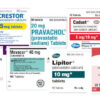By Sonya Vatomsky
SonyaVatomsky.com
Even if you aren’t aware of it, the chances are good that someone you know is taking some sort of psychiatric medicine. According to the most recent research, an estimated one in six adults in the U.S. have a prescription for antidepressants, anti-anxiety pills, or some other drug to help them manage their mental health. And with those drugs, for many of those people, come the side effects — some of which can feel dire enough to become a problem in and of themselves, requiring a second treatment to offset the first.
Many commonly prescribed antidepressants, in particular, can come with a host of side effects that can paradoxically contribute to depression. “Antidepressants saved my life and killed my orgasms,” writer Sofia Barrett-Ibarria declared in Self magazine in 2017; problems with sex are common, as are struggles with weight. Auxiliary medications are often prescribed to mitigate the severe side effects of primary medications, but can come with their own, like tinnitus (ringing in the ears) and digestion issues. The end result is that seeking treatment for mental illness is often a delicate tightrope walk toward health, one that forces patients to consider any number of trade-offs and carefully evaluate exactly what it means to live a good, happy life.
“It’s like, if the side effects make me just as depressed, then what’s the point?” says Melissa, a 38-year-old who currently takes both Zoloft (sertraline) and Wellbutrin (bupropion). With just the sertraline, she says, “I was so, so tired, gaining weight, and still wanting to kill myself occasionally.” Exhaustion and weight gain were contributing to the depression rather than curing it, so her doctor added Wellbutrin into the mix — a medication that can help with side effects of other pills, but isn’t itself risk-free.
“Wellbutrin is considered to be a medication without side effects by most doctors I’ve spoken to,” says Emily, a 26-year-old who finds the drug mostly effective but experiences heightened anxiety, an increased libido (“to the point that it is unpleasant,” she says), abnormal hair growth, headaches, and tinnitus. “Those [last two] aren’t as big of an issue for me,” she confides. “As bad as any other side effect is, weight gain is always worse.”
It’s a statement that resonates with many others whose weight rose or fell dramatically after starting a new medication. While mental illness is private, often invisible to outsiders, weight — especially for women — is highly visible, not to mention highly fraught.
Eleanor, who just turned 33, has started calling it “cheer chub,” to make herself feel better. “I’m thrilled to finally feel like a person again,” she says — her antidepressants are working well, and she found herself able to cook more, exercise, and actually partake in the hobbies she kept buying supplies for. Then she noticed the numbers on the scale didn’t make sense, given her lifestyle changes. “It was really discouraging for a bit,” she says, “since a big trigger for my depression is feeling helpless or unable to control things that are important to me.” “Cheer chub” is an attempt at rebranding, a way of reasserting her sense of control.
For patients who have found something that more or less works, deciding to stick to a treatment can come down to choosing the devil you know. But should it be that way?
It’s also the term Eleanor uses when talking about the uncomfortable issue with her friends: “It makes people laugh and relax when you’re talking about a sometimes touchy subject.” She talks about it with her psychiatrist, who she says is well versed in side effects and also willing to consider their emotional impact in a genuine, resourceful way.
For many patients, the physical impact can be just as frustrating. “It’s difficult to be focusing on my mental and physical health and have one negatively impact the other,” says Deidre, a 26-year-old who found her mental state deteriorating even as she stepped up her efforts to improve her health, becoming vegan and exercising more regularly. Gaining weight after starting an antidepressant was a hit to her self-esteem, she says, but she’s determined to double down on her efforts to stay healthy and fit, even if her medication now makes it more of a struggle.
“Many of my patients feel that their antidepressant has pushed them 10 steps ahead, but the side effects can keep them from feeling 100% better,” says psychiatrist Aparna Iyer, an assistant professor at the University of Texas Southwestern Medical Center. When a medication begins showing side effects, Iyer typically adopts a wait-and-see approach; sometimes the problems will dissipate with continued use. If they don’t, she works with the patient to categorize them into one of three buckets: side effects that can be tolerated, side effects that cannot be tolerated and must be managed through some other means, or side effects that cannot be tolerated and must require discontinuation of the medication.
Much of the time, Iyer adds, a patient who has tried several antidepressants and finally finds one that works will be hesitant to discontinue it, regardless of what else it brings. Emily, who has taken various antidepressants for about seven years, has had such a bad track record with side effects that she’s reluctant to try something new. “I feel like I experience every side effect under the sun,” she says. Once, after being prescribed trazodone to sleep, she woke up unable to urinate.
On the other hand, navigating both depression and ineffective treatments can leave a person unable to judge whether a side effect is truly problematic. “I’ve actually been depressed long enough that I don’t even know what my normal sex drive is anymore,” Eleanor says. “I just have no idea what my expectations should be.” For patients who have found something that more or less works, deciding to stick to a treatment can come down to choosing the devil you know. But should it be that way?
Psychiatrist Carly Snyder, who specializes in reproductive psychiatry and women’s mental-health services, argues that the right medication is one that only improves a person’s life, without causing notable negative results. When a patient complains of weight fluctuation, change in libido, or ability to orgasm, Snyder usually recommends exploring other options; the same goes for continued nausea or sleep difficulties.
“The notion that one must suffer through untoward side effects to gather benefits from an antidepressant is unnecessary and unjustified,” she says. “There are many antidepressant options available, and ‘the one’ is a fallacy. I do not believe anyone should have to remain on a medication if it is causing some measure of harm, and endless side effects are a version of harm.”
Snyder recommends pharmacogenomics testing, done in the office via cheek swab, to predict a patient’s response, based on their genetic makeup, to over 300 drug therapies. It’s a relatively new science that’s not yet foolproof, so she always uses the results alongside clinical judgment when making treatment recommendations — but still, she says, it can help a patient make the leap to a potentially better medication by taking out some of the guesswork.
“The topic of helping people balance side effects and efficacy of psychiatric medications is really part of the skill of psychiatry,” says psychiatrist Antonia S. New, a professor at Icahn School of Medicine at Mount Sinai. New encourages patients to share how their side effects are affecting their relationships, their self-esteem, and their overall enjoyment of life.
As with the medications themselves, though, figuring out what to do about side effects isn’t a one-size-fits-all system. Nor, for that matter, is figuring out what you need in order to achieve your desired quality of life. And both processes, as many people on antidepressants can attest, involve plenty of trial and error.
Sonya Vatomsky is a queer, non-binary Russian-American who has written for publications including Rolling Stone, The Atlantic, New York Magazine, Atlas Obscura, Smithsonian Magazine and Mental Floss. She can be reached on Twitter @coolniceghost.
This article was originally published on The Cut/New York Magazine. Reprinted with permission of the author.







